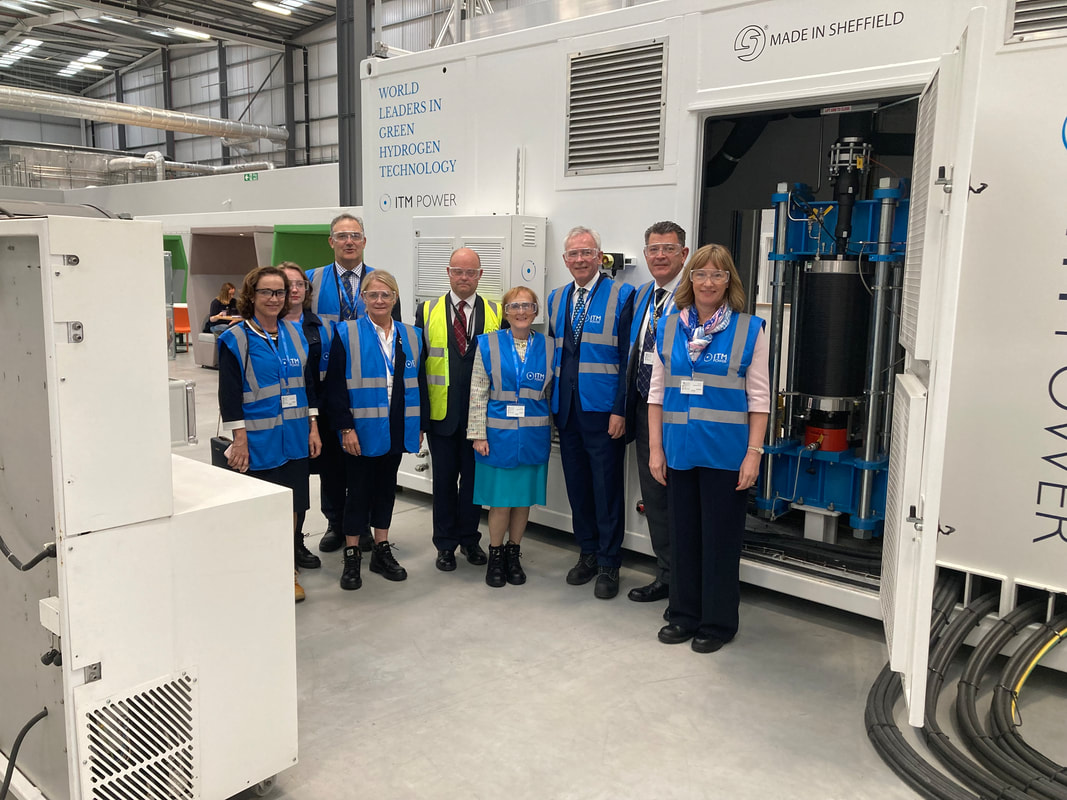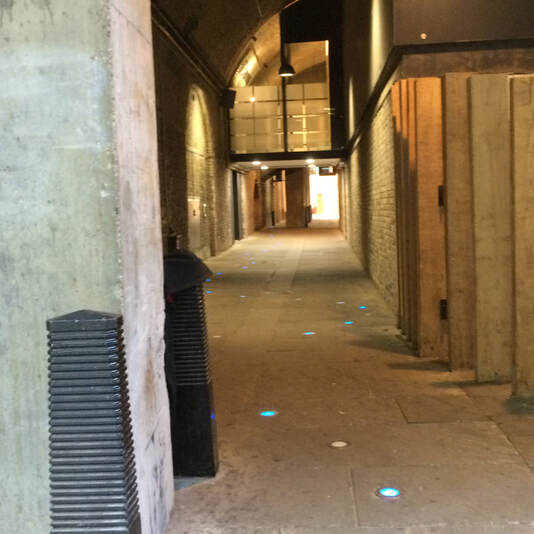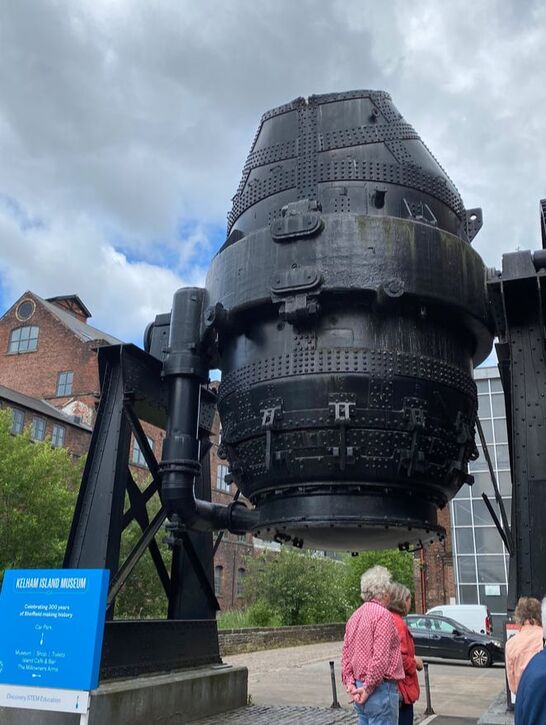 Sheriffs visit ITM Power with Master Cutler James Tear and wife Jo Sheriffs visit ITM Power with Master Cutler James Tear and wife Jo A visit to Sheffield for the Cutlers’ Forfeit Feast hosted by the Master Cutler of Hallamshire is a highlight of the year for the Lord Mayor and the Sheriffs. It might sound like a traditional Livery event – which is it – but the Master Cutler made it very relevant this year by providing an additional briefing and visit about the modern Sheffield economy. Made in Sheffield is such a familiar phrase, seen mostly on cutlery and flatware, that it is overlooked as to the implications that the term bears. The manufacturing might of Sheffield has driven a trade around items with a cutting edge for many centuries, with the Company of Cutlers of Hallamshire being established in 1624. The location of the City with a source of water power, stone for grinding wheels and iron ore – as well as engaging entrepreneurship meant that the businesses grew in a cluster around the City. Innovation such as the invention of the Bessemer Converter meant that the City was synonymous with steel throughout the world. The words Made in Sheffield were seen to be key to the quality mark and a Sheffield Defence Committee was set up in the 1900s to protect the name. The term is still boldly defended as a registered trademark and with a licencing arrangement that allows and regulates the use of the phrase. You can rely on it if it is Made in Sheffield. Against this background the Sheriffs met a great group of businesses for lunch and a conversation around the issues of today. The businesses included many that are still closely connected to steel, knives and allied trades. Other businesses had a more tech focused angle with engagement in AI and education, including the energetic University of Sheffield. Professional firms also attended as they are an important part of the business ecosystem alongside people from the heritage sector and civil society. Some of the themes aired were common across the businesses and have echoes throughout the nation – the cost of energy going up (in one case by 450%) and some of these are very intensive energy users. Supply chain issues were very urgent. Some of the businesses were setting up new buildings and expanding – key here is staffing and training as well as the good use of apprenticeships. A recruitment business reminded us of the number of job vacancies that held back such expansion as well as the right kind of education and guidance. Businesses were looking to expand internationally and efforts collectively to engage were appreciated. Climate and ESG issues were clearly a consideration with businesses ensuring that there is no waste in their processes and many were directly involved in this area via electric vehicles and similar products. In the afternoon we visited ITM Power who make electrolysers for green hydrogen and showed us around an expanding business park. The reach of their distribution and partnerships showed how important the use of green hydrogen will be for the future of energy. It was clear that Sheffield has a vibrant and innovative business and manufacturing community. We were privileged to meet them and share some thoughts and understand so much more about the economic drivers and industry needs. Thank you to Master Cutler, James Tear.
0 Comments
 Steelyard Passage in Dowgate Ward Steelyard Passage in Dowgate Ward A break from business meetings in August has meant that I have been able to experience some of the wider community work of the City Corporation. I spent an afternoon with the City Corporation rough sleepers outreach team that is provided by the charity Thames Reach. I was warned that on a hot City afternoon I was not likely to meet many people sleeping rough but I was keen to learn more about the work and the City’s plans. Rough sleepers are not necessarily the street drinkers nor those found begging. They are perhaps more likely to be secretive and tucked away in quiet corners of buildings and alleys finding a quiet and safe place to sleep. My walkaround was to look at the HIRSS, the high impact rough sleeping sites and see where the regulars bed down and find out a bit more about the work. My walk around the City took us down by the River and through my own Ward of Dowgate and Steelyard Passage a regular spot to find people asleep in dry covered conditions. We returned via Aldgate and Liverpool Street. I have had a long term interest in homelessness since I spent 6 months as a volunteer with the Cyrenians in Durham. I had finished my degree and went to live alongside a changing population of rough sleepers in a Cyrenian house/hostel. The model was that I would act as the “house mother” earning the same as the resident men who were on a basic benefit and I would buy food and cook for them. With a local support group we tried to give stability and some connection for the men as well as a domestic setting for companionship and sharing. It certainly helped me to understand something of the life on the street and its dangers as well as the problems arising from family and marital breakup, drinking and criminal activity. Since then I have been involved with my own Church, the West London Mission, and their long term work with homeless people and more recently have been a member of the Corporation’s own Homelessness and Rough Sleeping Subcommittee. As it happens we did meet three men and one woman. They were each ready to engage with us and clearly trusted Thames Reach https://thamesreach.org.uk/ and the City as people to whom they could confide their current position and issues. One had lost his phone and a promise was made to replace it. A phone is a vital communication aid for anyone on the street in order to claim any benefit or be in touch with a nominated worker, GP or other help. You need a phone to keep track. Otherwise Peter (as I shall call him) was upbeat, had water and provisions in his rucksack and in fact had accommodation - but liked being out on the street and chatting to lots of passers-by. He was well known to the worker and so we had an easy conversation about the location and changes to it over time. Peter had had a job and might get one again with the right support. Hamid was sitting down with his girlfriend sleeping alongside. Whilst not known to the worker they visited the Dellow Centre run by Providence Row in Shoreditch. I was pleased we could help when he asked for some food and happy we could get his preferred tuna toasty from a local café. We agreed to put him in touch again with the Dellow and offered help from the City as well. The last man was found at the bottom of a stairwell and the worker just chanced a shout down that reverberated with a response and a request for help. Mike had come off drugs for a while but relapsed and was using again. He had accommodation but was not living there as the environment was hostile. He wanted help to change his accommodation to another area and to get off drugs. He was anxious to sort this out and after we left him he rang the worker to check that he would not tell anyone on the street where he was. There are clearly undercurrents around the community. The recent annual centralised count of rough sleepers from 2021 showed that there were 20 people rough sleeping in the Square Mile on the one October night that is used as a data comparator across the UK. The number has varied from a high of 67 in 2018 to 23 in 2021 during the pandemic. It is an ok figure if one accepts that it would be difficult to be zero. The number of individuals sleeping rough over the month of October 2021 was 108 and so that is the number that the outreach workers are roughly in touch with. The Thames Reach outreach team walk the City both in the early morning and at night in order to engage with all those sleeping rough with a view to finding out and connecting with them and offering help. They will refer them to an assessment centre run by Thames Reach and the City if they are willing to engage. It might be a long process to gain trust and establish the right help that is needed. If you see someone sleeping rough you can report this to Streetlink that alerts the outreach team who can then connect with the person. There is a website https://www.streetlink.org.uk/StreetLinkLoginvf and an App. During the pandemic the City opened the Carter Lane Assessment Centre in the Youth Hostel that normally operates there. This service was part of the Government’s programme of “Everyone In” and during the two year period it supported 159 individuals. 106 individuals moved positively on from the service and 72 of these individuals moved into sustainable long-term accommodation. Of the numbers 138 were men and 21 women. 89 were UK Nationals and the next highest nationality was Polish (16) and Romanian (15). The many needs of the occupants were dealt with around health care, psychotherapy, drug and alcohol abuse and immigration issues. It was a considerable success and built relationships with the other agencies and is shaping the work of the City’s department still. The City now uses an hotel in Shoreditch as an assessment centre and has a dynamic plan to provide more help and assistance to this part of our City community. I was pleased to see the City through the eyes of a rough sleeper, spying out quiet and secluded spots out of the rain or sun and away from prying eyes and potential trouble. At the same time I would not want the issue of homelessness and the surrounding mental health and addiction issues to be hidden away. These are really serious aspects of our capital’s wellbeing. In New York, on my recent visit in July with the Lord Mayor, I was told how the rise in rough sleepers on the streets and in the subways is such that people are not using public transport due to the disruption that those with mental health issues are causing and many are returning to their cars to commute. The Lord Mayor commented that the same was true in San Francisco when he visited earlier in the year. We do not want to create a City with people rootless and disengaged. The Corporation’s strategy of engagement and plans for purposeful work to provide assessment and follow up help is a great contribution to help the individuals, and our City, thrive. |
Details
AuthorAlison Gowman Archives
January 2024
Categories
All
|
Follow Alderman Alison Gowman on Twitter: https://twitter.com/GowmanAJ
Alison Gowman: As an elected Alderman within the City of London: https://democracy.cityoflondon.gov.uk/mgUserInfo.aspx?UID=229
Privacy policy: https://www.alisongowman.org/privacy.html
Cookie policy: https://www.alisongowman.org/cookies.html
Terms & conditions of website usage: https://www.alisongowman.org/tandc.html
Alison Gowman: As an elected Alderman within the City of London: https://democracy.cityoflondon.gov.uk/mgUserInfo.aspx?UID=229
Privacy policy: https://www.alisongowman.org/privacy.html
Cookie policy: https://www.alisongowman.org/cookies.html
Terms & conditions of website usage: https://www.alisongowman.org/tandc.html


 RSS Feed
RSS Feed